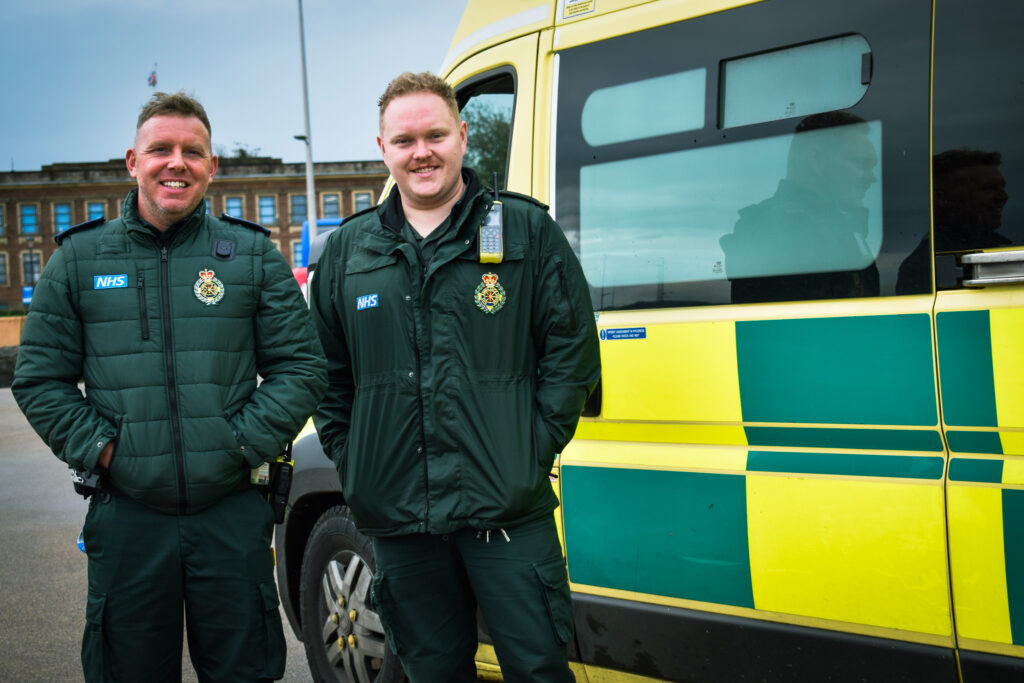Improving Engagement and Culture Through the NHS Staff Survey – North West Ambulance Service NHS Trust

North West Ambulance Service NHS Trust (NWAS) is the second largest ambulance trust in England, serving more than 7,000,000 people across approximately 5,400 square miles, covering the communities of Cumbria, Lancashire, Greater Manchester, Merseyside, Cheshire and Glossop (Derbyshire). The organization employs over 7000 staff, in more than 300 different roles and has more than 1000 volunteers supporting them.
Their vision is to deliver the right care, at the right time, in the right place. Every time. The NWAS vision is ambitious. To achieve it they need to balance getting the basics right while continuously striving for excellence. Their greatest asset is their people, and they want NWAS to be a brilliant place to work. Their people strategy aligns with the NHS People Promise, which aims to improve the experience of working in the NHS for everyone.
Achieving Their Best-Ever Response Rate
NWAS have achieved their highest-ever response rate to the NHS Staff Survey for 2023 of 48%, a huge jump from 33% in the previous year. They have received over 3400 responses, which is around 1200 more than 2022. The Executive Team recognises the importance of listening to staff. The annual staff survey is an important avenue for gathering staff feedback, alongside the National Quarterly Pulse Survey. Further to this, qualitative data from focus groups and local engagement is triangulated with survey results and workforce metrics, to provide data insights to meaningfully drive forward positive change.

Their 2023 survey campaign was sponsored by the Director of People and centred around a robust communications plan with a focus on ‘you said, we did’ style campaign messaging, showing how survey participation can drive positive change throughout the organisation.
They also review the weekly progress of individual teams, and where they identify lower response rates, their Workforce Wellbeing Officers engage with these teams and their leaders to increase their responses. Weekly response rate updates are also sent to senior managers, who are asked to engage with their local teams to improve response numbers.
Managers in contact centres facilitate dedicated time for their colleagues to complete the surveys during quieter periods of activity. The staff experience team works with key stakeholders such as their staff networks, trade union groups, and the communications team across the Trust to raise awareness and the importance of staff having their say, linking this work back to the People Promise theme of ‘we each have a voice that counts’.
Finally, their leadership team incentivises staff to participate in the survey by offering a £5 reward voucher which can be redeemed at either Costa or Café Nero. Previously they had operated prize draw incentives, but offering all respondents a voucher appears to have a stronger impact.
How North West Ambulance Service NHS Trust Improved Results…
The 2023 staff survey responses are showing improvements across all areas of the NHS People Promise elements. The text below shares some examples of work that have helped improve responses and ultimately, improve staff experience and culture across the Trust.
Freedom to speak up
Across all questions relating to speaking up, there are improved results compared to 2022. However, only about half of respondents feel confident that speaking up will lead to any changes being made by the leadership teams.
In response to survey results related to speaking up, proactive measures are being taken, particularly to address concerns around civility and dignity in work. Recognising the importance of a respectful and supportive workplace, the organisation has meticulously designed training sessions for leaders and staff to emphasise the importance of civility in the workplace.
These sessions are now an integral part of the induction process, ensuring that every new member of the team understands and commits to maintaining a civil and professional environment from day one.
It is also recognised that anonymity is crucial when it comes to speaking up and raising concerns. Colleagues have expressed apprehension about potential repercussions, which has deterred them from voicing their issues. In response, an anonymous online form has been developed, now accessible on all frontline devices. This tool provides a secure and confidential way for employees to report concerns, ensuring their voices are heard without fear of identification or retaliation while providing an opportunity for leaders to be made aware of and act on concerns raised.

Through these targeted actions and the buy-in of all leaders, a safer, more respectful, and supportive workplace is actively being fostered by addressing the critical issues raised by employees and demonstrating the organisation’s unwavering commitment to their wellbeing.
Sexual Safety Campaign
NWAS observed a rise in reports from staff regarding unwanted sexual behaviour in the workplace, which is concerning, as they are committed to ensuring their staff feel safe and free from any fear or experience of such behaviour while at work.

To address this pressing issue, the Executive Leadership Committee signed up to the NHS England Sexual Safety Charter and the AACE Consensus Statement on reducing misogyny and enhancing sexual safety. These commitments require the leaders to take concrete actions, and they have already begun this important work. A multidisciplinary project group has been established to lead and drive these initiatives forward.
The group focuses its efforts on the following key areas:
- Developing clear standards of behaviour within the organisation.
- Improving options for safe reporting and eliminating barriers to speaking up.
- Reviewing the leadership approach to handling complaints related to sexual safety and providing robust leadership support to those involved, particularly complainants.
- Collecting and sharing lived experiences with the assistance of their networks.
- Raising awareness through education to enhance the understanding of sexual safety.
- Changing the acceptance of inappropriate behaviour and encouraging everyone to challenge such behaviour when they witness it.
Through these comprehensive measures, the organisation aims to create a workplace where all employees feel secure and respected, reinforcing their commitment to a safe and supportive environment for everyone.
Workforce Wellbeing
The wellbeing of their staff is a top priority, and NWAS’ executive leadership team is committed to building a happy and healthy workforce. They recognise the emotional and physical impacts of both life and work, striving to create a psychologically safe environment where fundamental needs are met, and staff feel confident they will receive the support they need.
Recent National Staff Survey results indicate progress in wellbeing-related areas. However, around three-quarters of respondents report feeling burnt out from work, and less than half believe the organisation is effectively addressing wellbeing concerns.
In response, they have invested significantly in a variety of wellbeing services and initiatives over the past year. Additionally, a new Workforce Wellbeing Team has been established to ensure wellbeing resources and initiatives are more accessible to all colleagues across the trust.
To further enhance wellbeing support for staff, they launched a new Wellbeing Hub in May 2024. The Hub serves as a comprehensive resource for health and wellbeing at NWAS, offering a single point of contact for staff and managers to access a wide range of support services.

The Wellbeing Hub can be contacted by staff and managers by phone or email, and responses to queries are coordinated by the Workforce Wellbeing Officers.
In early 2024, a member of their leadership development team became part of the NHS Local Leaders Wellbeing Programme, to become a trained facilitator in delivering the programme, and further create cultures of Wellbeing. The materials are currently being built into NWAS’s existing leadership development to help support their line managers to better look after their wellbeing so that they are better able to care for the teams they lead.
Key Learnings
Be flexible in approach
What works well for one team, may not for another. Being flexible allows change to happen without being prescriptive and meets the needs of the staff rather than a tick in the box.
Demonstrating value of feedback is paramount.
Colleagues need to know how their voice and insights have made a difference previously, in order for them to be engaged next time.
The onus for increasing response should not be solely on the staff engagement team (or similar)
It is important that this responsibility is shared by leaders and their teams across the trust.
What Comes Next?
Developing Leaders Programme
NWAS are excited to introduce the Developing Leaders Programme, #LeadNWAS, designed for individuals aspiring to take on leadership roles within NWAS. This comprehensive twelve-month program offers a variety of experiential opportunities tailored for all developing leaders, encompassing both clinical and non-clinical activities. Participants engage in a series of skill-based workshops and work on real projects, ensuring relevance and practical application for everyone involved. Launching in the summer of 2024, it aims to provide a platform for aspiring leaders to grow and excel within NWAS.
NHS People Promise Exemplar Site Programme
NWAS is thrilled to be part of the NHS People Promise Exemplar Sites programme, they recently appointment a People Promise Manager, to improve the working experience for staff through innovative practices and exemplary leadership in a variety of areas, with a particular focus on reward and recognition, and flexible working across the Trust.
Staff Survey Action Group
Plans are in place for the formation of a Staff Survey Action Group representing a strategic initiative to enhance the organisation’s commitment to employee engagement and satisfaction. This initiative is grounded in several key principles and benefits that align with the organisation’s goals and values, while also supporting the NHS People Promise, People Promise Manager role, and ultimately positively impacting staff retention and improving patient outcomes.
Contact Information
For more information about this case study contact:
Usman Nawaz
Head of Culture & Staff Experience Usman.nawaz@nwas.nhs.uk